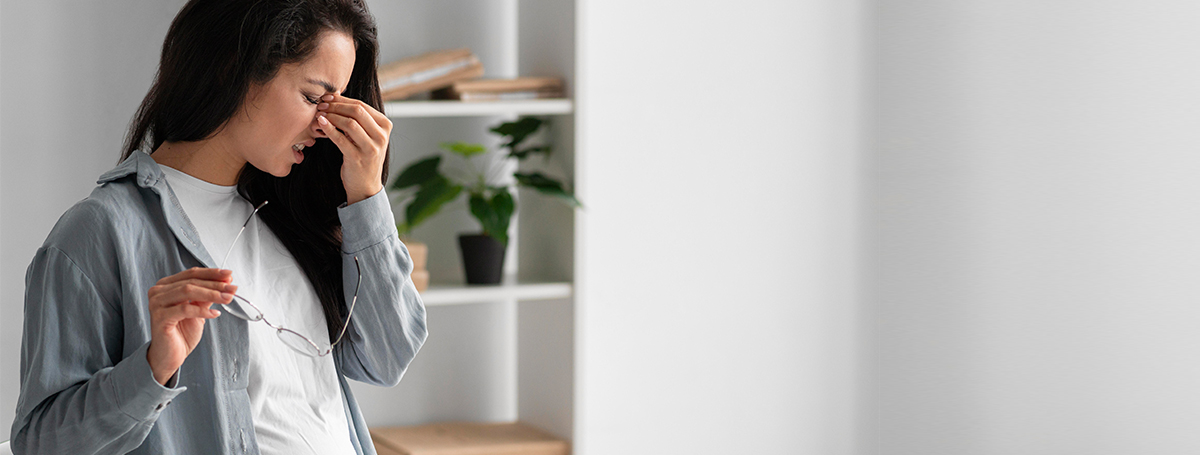Morning Sickness: What Every Mum-To-Be Needs to Know
Are you finding yourself struggling with morning sickness, fatigue, backaches, swollen feet, leg cramps and whatnot? Wondering if you’ll ever feel normal again? If you’re asking, “When does morning sickness start?” and “How long will this last?” we’ve got you covered in this blog.
Morning sickness is a common part of pregnancy, and the symptoms – nausea, vomiting, and food aversions – can be challenging. It often begins around the sixth week of pregnancy and can vary in severity.
The good news is, there are ways to manage and even reduce these discomforts. But first, let’s understand what causes morning sickness.
Understanding the Causes of Morning Sickness
Morning sickness is one of the most tiring parts of your pregnancy journey. Here’s a closer look at what might be causing those unsettling symptoms:
- Hormonal Changes: Morning sickness typically begins around the sixth week due to rising levels of hormones like hCG and oestrogen. These changes are essential for your baby’s development but can upset your stomach, leading to morning sickness.
- Increased Sensitivity: Your senses are heightened during pregnancy, making you more sensitive to certain smells and tastes. This can trigger nausea and vomiting, which are common morning sickness symptoms.
- Stress and Fatigue: Feeling overwhelmed and tired can increase your morning sickness. Ensuring you get enough rest and managing stress can help reduce some discomfort.
Identifying Morning Sickness Symptoms and Severity Levels
Unfortunately, morning sickness during pregnancy is an unavoidable phase, but understanding your symptoms can make a big difference. Here’s a guide to help you identify what’s going on:
- Common Symptoms: Morning sickness usually includes nausea, vomiting, and an aversion to certain foods or smells. These symptoms typically start around the sixth week of pregnancy and can vary in intensity.
- Mild Symptoms: If you’re feeling sick and nauseous but can still eat and go about your day, your morning sickness is likely mild.
- Severe Symptoms: If you’re struggling to keep anything down, feeling constantly nauseous, or losing weight, this could be a sign of more severe morning sickness.
Treatments for Morning Sickness
Here are some helpful tips to ease the discomfort of morning sickness and make your pregnancy journey a bit smoother. :
- Small, Frequent Meals: Eating small meals throughout the day can help keep nausea at bay.
- Stay Hydrated: Sipping water, herbal teas, or soups can help you stay hydrated. Ginger tea or lemon water will also help soothe your stomach.
- Consult Your Doctor: If your morning sickness is severe or persistent, speak to your healthcare provider. They may recommend safe treatments or medications to help manage your symptoms.
Our Products
Dietary and Lifestyle Modifications
Here are a few diet and lifestyle changes that might help ease the morning sickness symptoms.
- Choose Bland Foods: If experiencing morning sickness during pregnancy, opt for bland, dry foods like toast or bananas. These can be easier on your stomach, especially when morning sickness symptoms
- Avoid Strong Smells: Strong odours, like cooking smells, can trigger morning sickness symptoms. Try to avoid strong odours and use a fan to ventilate your kitchen and other rooms.
- Get Plenty of Rest: Fatigue can worsen morning sickness. Make sure to get plenty of rest and take naps if needed.
Prevention Strategies for Morning Sickness
While you can’t always prevent morning sickness entirely, there are steps you can take to reduce its impact. Here’s how to keep those unwelcome morning sickness symptoms away:
- Avoid Trigger Foods: Pay attention to which foods or smells set off your nausea. Try to identify triggers early and avoid them.
- Get Fresh Air: Ventilating your living space and getting some fresh air can help alleviate morning sickness symptoms. A short walk outside might also do wonders.
- Acupressure Bands: Some people find relief using acupressure wristbands, which apply gentle pressure to a specific point on your wrist to reduce nausea.
- Vitamin B6 Supplements: Studies suggest that vitamin B6 can help reduce nausea. Speak to your doctor about whether a supplement or foods rich in vitamin B6, like bananas or avocados, could help.
Conclusion
As you navigate through morning sickness, remember that it’s a temporary but tough part of your pregnancy. It can feel like an endless saga, but you will eventually feel better. A few key takeaways to keep in mind: listen to your body and find what soothes your symptoms, whether it’s a particular food or a simple relaxation technique. Also, don’t hesitate to reach out for support, whether from your healthcare provider or fellow expectant mums who’ve been through it.


To ease morning sickness in early pregnancy, try eating small, frequent meals, staying hydrated, and avoiding strong smells. Ginger can also be helpful.
Morning sickness is caused by hormonal changes during pregnancy, particularly increased levels of hCG and oestrogen. Stress, fatigue, and certain foods can also contribute to the symptoms.
Pregnancy nausea typically starts around the sixth week of pregnancy. It’s often felt in the morning but can occur at any time of day.
Morning sickness usually lasts until around the end of the first trimester, about 12-14 weeks. However, some may experience it longer. Each pregnancy is unique, so symptoms vary.





